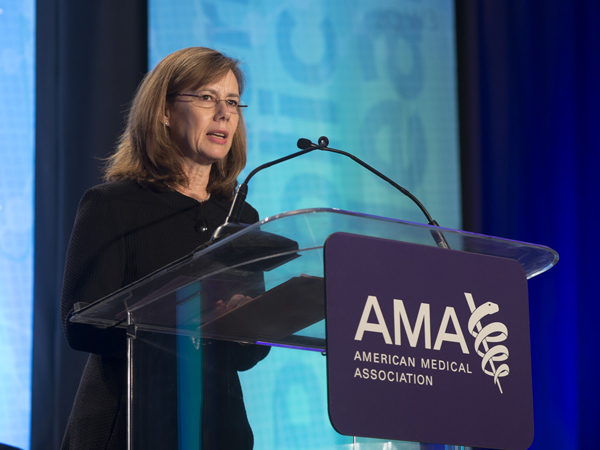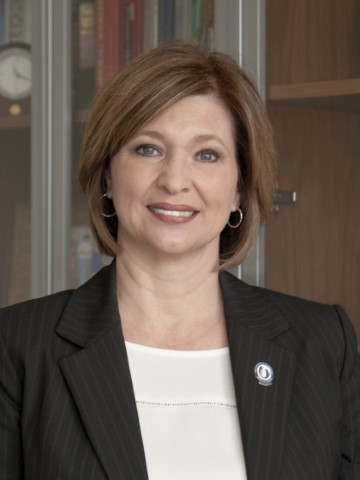State health officer, UMMC alum reaps prominent AMA award

Dr. Mary Currier, State Health Officer for Mississippi and a 1983 graduate of the UMMC School of Medicine, has received the American Medical Association’s highest honor for elected officials and government employees.
Presented at a Feb. 23 recognition dinner in Washington, D.C., the Nathan Davis Award for Outstanding Government Service went to Currier, a former UMMC faculty member, for her efforts to advance public health.
“I appreciate the relationship UMMC has with the Mississippi State Department of Health, and Mary’s leadership for our state,” said Dr. LouAnn Woodward, vice chancellor for health affairs and dean of the School of Medicine.

“She is a trusted colleague and friend, and I’m proud of her recent honor from the AMA.”
Named for the founder of the nation’s largest physician organization, Nathan Davis Awards are presented each year in seven categories of public service, including local, state and federal government.
“I am honored and humbled by this award, and surprised,” Currier said. “I have been told by friends, colleagues and family that I am stubborn; I didn’t ever think I would get an award for it.”
The Mississippi State Medical Association nominated Currier for the award, one of the most prestigious honors given nationally to elected officials and career government employees.
Recipients must have met one or more of several criteria, including those related to public health improvements, leadership and personal integrity.
Among Currier’s accomplishments is her work to require immunizations for school attendance, which led to legislation that has been praised nationally.
“This award really goes to the people I get to work with on a daily basis at the health department,” Currier said, “and to all the people who have worked with us to make sure our good immunization laws and policies stay intact to protect our children.”
According to her friends and colleagues, she was destined to reach the position she now holds as the head caretaker of public health in Mississippi. One of her heroes is a giant in the field of preventive medicine, the 19th century English physician Dr. John Snow, who discovered the source of London’s 1854 cholera epidemic.
As a former medical consultant with the Mississippi State Department of Health, Currier launched her career with the agency in the early 1980s, rising to the top position in 2010 after serving as State Epidemiologist for 10 years, until 2003, and again from 2007 to 2009.
One of her biggest influences was her father, the late Dr. Robert Currier, the first-ever chair of UMMC’s Department of Neurology and a 2014 inductee into the UMMC Medical Hall of Fame.
“My Dad would come home with tales of work that taught me to get along with people, but to still let your opinion be known — with a smile,” Currier said. “You can say almost anything if you smile while you say it.”
Brought up in Ann Arbor, Michigan, for the first few years of her life, Currier was 5 when her family moved to Jackson after her father was recruited to work at the Medical Center.
She ate lunch at the UMMC cafeteria with her father, and wrapped Christmas presents for sick children with her mother, Marilyn Currier of Jackson, a former English teacher.
“Really, UMMC is where I grew up, so it has influenced everything I do,” Currier said. “UMMC is an essential partner in maintaining and improving health policies in this state, and has supported good public health policy, both through advocacy and through teaching and training students in so many health disciplines.”
For six months in the mid-1970s, the family, including adopted daughter Angela, rented a place in Dublin, Ireland, where Dr. Robert Currier researched the possible causes of multiple sclerosis. As a teenager, Mary Currier was fascinated by his research papers — the way cold, hard numbers could help explain, and lead to the alleviation of, human suffering.
In 1977, she returned to Ireland as a young adult to study for a year at Trinity College before completing her undergraduate degree at Rice University a year later.
Still uncertain if she was medical school material, she spent a year or so working as a waitress, and then as a lab tech, before deciding once and for all on a career in medicine. At UMMC, she met her future husband and ophthalmologist/surgeon, Dr. Robert Mallette.
They brought up two sons: Dan Mallette, now a school teacher, and Dr. Drew Mallette, a fifth-year general surgery resident at UMMC.
Currier’s own residency was in pediatrics, but she decided to take a job as staff physician with the Department of Health under her mentor, Dr. Alton Cobb, the state’s chief health officer from 1973 until 1993.
She left that position long enough to earn a Master of Public Health degree from the Johns Hopkins School of Hygiene and Public Health in 1987 in Maryland, before returning with her husband to Mississippi.
Working under then-State Health Officer Dr. Ed Thompson, Currier became State Epidemiologist, serving from 1993 until 2002. When Thompson joined the Centers for Disease Control and Prevention in Atlanta, Currier took a faculty appointment at UMMC for the next five years.
During that period, the health department came under fire for some of its practices, and the reconstituted State Board of Health invited Thompson to resume his old job. He brought Currier back with him, in her old job. Upon his death a few years later, the board appointed Currier as Thompson’s successor.
During her tenure, the state has seen declines in rates of infant mortality, tuberculosis, syphilis, and deaths related to Sudden Infant Death Syndrome.
“Really I am just very lucky, lucky to have the family I was born with, lucky to have the family I married into and lucky to have the family we raised, including a new grand baby,” Currier said.
“I am lucky to live in a state where people understand that with so few resources, we have to work together to accomplish improvements in health.”


